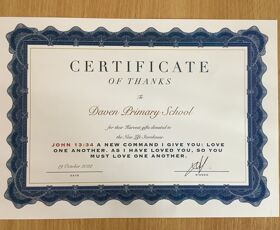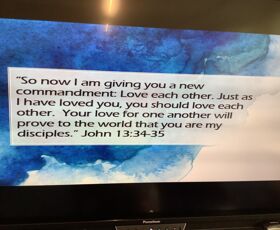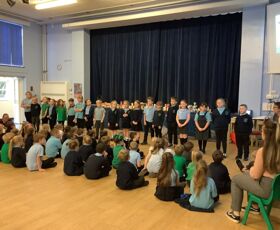Religious Education and World Views
BackWhat do we intend pupil's to learn in Religious Education at Daven?
Whilst not being part of the National Curriculum it is mandatory that schools in the UK encounter Religious Education through a class lesson and school assemblies each week. Collective Worship is legally required to take place every school day and ‘shall be wholly or mainly of a broadly Christian character’ (1988 Education Act).
The Religious Education syllabus is set by local education authorities and at Daven Primary School, we follow the Cheshire East syllabus and Scheme of Work. This allows children the freedom to explore their spiritual, moral, social and cultural development. Children develop knowledge and understanding of a range of religions and world views as they begin to develop their own ideas, values and identities. It should develop pupils with an aptitude for dialogue so they can participate positively in society with diverse religions and secular world views. Our RE curriculum aims to develop religious literacy through the use of different lenses such as: Theology (believing), Philosophy (thinking) and Human and Social Sciences (living).
Religious Education and World Views contributes dynamically to children and young people’s education in schools by provoking challenging questions about meaning and purpose in life, beliefs about God, ultimate reality, issues of life and death and issues of right and wrong and what it means to be human.
In RE they learn about and from religions and worldviews in local, national and global contexts, to discover, explore and consider different answers to these questions. They learn to weigh up the value of wisdom from different sources, to develop and express their insights in response, and to agree or disagree respectfully.
Intent
The curriculum for RE aims to ensure that all pupils:
- Know about and understand a range of religions and world views.
- Express ideas and insights and the nature, significance and impacts of religions and worldviews.
- Gain and deploy the skills needed to engage seriously with religions and world views.
Implementation
Religious Education and World Views is taught discretely across the school although it may impact on other curriculum areas. It is taught using the agreed Cheshire East syllabus; however, this syllabus will be updated/reviewed in the next 12 months. Each unit of work is enquiry-based and is led by a question which directs the area of learning. In KS2, pupils have Read and Discover three times a week, which often discussed key religious events and news around the world.
The RE programme of study follows the new Cheshire East Agreed Syllabus (2022) using the Cheshire East and Chester Diocese planning.
- Faiths are covered in depth over a series of lessons throughout a half-term to ensure children can fully immerse themselves in the faith.
- RE topics at Daven cover a wider range of religions and faiths: Christianity, Judaism, Islam, Hinduism, Humanism.
- All RE at Daven is enquiry-led in order to promote engaging, interesting discussions that are inclusive for all children.
- The Cheshire East Agreed Syllabus is rooted in developing:
- Engaging Encounter with religions/world views.
- Reasoned Response to religions/world views.
- Connecting Communities with religions/world views. - Our long-term plan maps the religious education topics in each term over each Key Stage. (see the document attached in the Subject Documents section below).
|
Reception:(3 terms) Christianity |
Key Stage 1: Year 1 & Year 2 (6 terms) Christianity 4.5 terms or equivalent Judaism 1 term or equivalent Free choice of enquiry 0.5 term |
|
Key Stage 2: Year 3 & Year 4 (6 terms) Christianity 3 terms or equivalent Islam 1.5 terms or equivalent Judaism 1 term or equivalent Free choice of enquiry 0.5 term |
Key Stage 2: Year 5 and Year 6 (6 terms) Christianity 3 terms or equivalent Islam 1 term or equivalent Hinduism 1 term or equivalent Free choice of enquiry 1 term |
Impact:
- Assessment within RE should be meaningful and support monitoring and tracking of pupils over time.
- RE is assessed at the end of each unit (half-term) using low-stakes quizzes.
Personal Development with RE and World Views
- Children will have a stronger awareness of the world around them and will be mindful of the beliefs of others.
- Children will feel they are valued as individuals and that their beliefs are valued and celebrated.
- Enjoyment of the RE curriculum will promote creativity, achievement, confidence and an enquiring mind.
- Children feel safe to learn new things and share their beliefs with others in an accepting environment.
- Children promote social and ethnic harmony, with an awareness of the British values.
- Children develop deeper understanding of their own and other’s rights as global citizens through the connections made to Rights Respecting Schools Award and the UNICEF Articles (Article 14: You have the right to choose your own religion and beliefs. Your parents should help you decide what is right and wrong, and what is best for you. Article 30: You have the right to practice your own culture, language and religion - or any you choose).
- Children leave the school with a sense of belonging to a tightly-knit community where they have the confidence and skills to make decisions, self-evaluate, make connections and work in partnership to improve the life chances for all.
| Subject Documents |
|---|
| RE End of Key Stage Statements |
| RE Long Term Plan |










